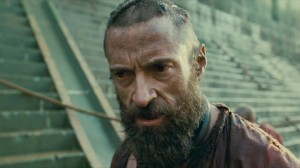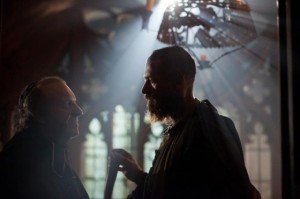Every early morning in New York, says Justice Fellowship’s Pat Nolan, a Jean Valjean gets off a bus and heads to an uncertain future. The clothes and technology may have changed since the days depicted in Les Miserables (review here), but the basic plight of the imprisoned and paroled remains the same.
The story of released convict Jean Valjean transformed by an act of grace really hits home for Nolan.
In Prison – You Ain’t Got Nothing Coming
Look down, look down,
You’ll always be a slave
Look down, look down,
You’re standing in your grave – Convicts at work

The film begins with convicts serving hard labor singing “look down.” They ask if anyone remembers them, they wonder if family has forgotten, if God has forgotten, or if they will ever be released.
Nolan remembers that feeling.
“You wonder if anyone remembers or cares about you,” he said when we talked by phone, “As in the movie, prison dehumanizes you. The prisons I was in, thousands of times in the two years I was there, they said, ‘You ain’t got nothing coming.’ It’s said with hate. The implications is you came from nothing, you are nothing, you’re worthless.”
A former California Assemblyman from a good background, Nolan plead guilty to one count of racketeering in connection with an FBI sting on campaign contributions. He served 25 months in prison.
He knew “You ain’t got nothing coming” wasn’t necessarily true because he’d had good experiences in life, he says, but “think of the poor kids who have never been respected in their lives, never been told they’re loved. It takes such a toll on who they are. They begin to believe it.”
Nolan is especially concerned for female inmates. “The public would be shocked to know that women get far fewer visits than men,” he said, a truth he witnessed first hand by observing the women’s facility opposite his own prison. “They’re usually in prison because of their boyfriend. Maybe he’s been dealing drugs, and makes a deal and drops a dime on them. The families are usually angry because they warned of the boyfriend. Plus, if they have children, the children get dumped on relatives and they resent it. They’re willing to do it, but adds the burden of their own kids or grandparent has to pick up the burden. They’re angry at the prisoner.”
Even more heartbreaking, he says, the caregivers are “exhausted because they’re working all week to support these kids. Prisons are often far from urban areas. Who can work all week long and pile the kids in the car to go for a visit? How do they get there? Where do they stay? Some of the families sleep in the car just to visit.”
“Prison experience is very tough on women. Then to have no one there to greet them, no wonder they slide back into trouble again.”
On Parole – The Wolves are There
Now I know how freedom feels
The jail is always at your heels
It is the law
This piece of paper in my hand which bids me cast throughout the land
It is the law
Like a cur
I walk the streets
The dirt beneath their feet – Jean Valjean

“When [Valjean] is released and he gets turned away at the inn because his password is stamped convict, that’s modern days,” said Nolan, “Since 9/11 you can’t rent a hotel room, take a bus, or do anything with out an ID. They leave prison with no ID but prison ID. They’re marked. Marked men and women.”
Men and women are released, separated from family and community, often with nothing more than a bus ticket, says Nolan. They may have intentions of living a straight life, but they have little support and little hope for being able to make it into a job. And, circling are the dark options that seem like the only options: Prostitution. Drug abuse. Crime.
“The wolves are there, they’re ready to pounce.”
“Jean Valjean faced those problems then, but every year 700,000 inmates are released in America. In Alabama, they’re released with a check for twenty dollars. With no ID, they can’t cash the check. Even that is worthless to them.”
But there are people who do care. Near San Diego, Welcome Home ministries tries to help. “When a woman is going to get out, Carmen meets them at the bus, buys them a meal, gives them a good set of clothes, a whole set of services.”
An Act of Grace – I’m Not Going to Give Up on You
Come in, Sir, for you are weary,
And the night is cold out there.
Though our lives are very humble
What we have, we have to share. – The Bishop
Even after Jean Valjean takes advantage of the bishop’s kindness by stealing his silver and is captured by the police, the man extends grace. He not only gives him the stolen silver, but the candlesticks he had not stolen. This interaction is key for Nolan.
“The affirmation of worth, as we saw in Les Miz, the priest, who spontaneously covered for him and gave him the silver candlesticks said ‘you’re worth risking for.’ And put him on the right path to do great good for everyone around him.”
“That really rings home. It’s only the generosity of people who often times for religious motivation, are willing to look at the inmate, see they carry the image of God, spark of divineness, that says there’s worth. I’m not going to give up on you, not going to throw you on the ashheap. For those that do it makes all the difference in the world.”
As an example, Nolan cites Korn Galvanizing in Pennsylvania. Nolan says the owner and CEO agreed to hire former prisoners. Both Catholics, they did it because they felt “Jesus told me to.”
“Now over half of their employees are ex-offenders. They are the most valuable, hardworking employees. They are so grateful for the opportunity, for the grace extended to them. He says those former offenders are invaluable because they work so hard, they are so loyal, grateful for the job.”
Nolan is a realist. “Everybody to whom grace is extended doesn’t turn out right. We’re not Pollyannas. Some people continue in their life of crime. But the fact that some don’t take advantage of grace doesn’t mean we should deny it to everyone. Why on earth would we presume they wouldn’t? Let’s extend a second chance.”
Who knows? That man or woman getting off a lonely bus in the early dawn light might just be a new Jean Valjean in the making.













